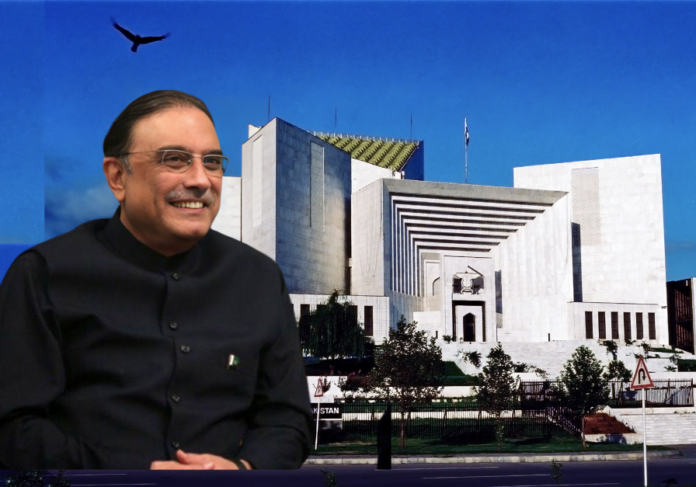President Asif Ali Zardari has officially greenlighted the Supreme Court Practice and Procedure Ordinance 2024 Amendments, a significant legislative move that reinstates the exclusive powers of the Chief Justice of Pakistan (CJP) to constitute benches. This development marks a notable shift in the landscape of judicial authority within the Supreme Court, restoring a level of discretion previously curtailed by the amendments made during the Pakistan Democratic Movement (PDM) coalition government.
Restoration of Chief Justice’s Powers
The enactment of the Practice and Procedure Ordinance 2024 Amendments follows the approval from President Asif Ali Zardari, which allows Chief Justice Qazi Faez Isa to appoint Justice Amin-ud-Din Khan to the judges’ committee, replacing Justice Munib Akhtar. This committee plays a crucial role in the formation of benches within the Supreme Court, tasked with handling significant human rights cases and other critical matters.
The Office Order issued by the Supreme Court clarifies that this nomination is in line with the provisions of Section 2(1) of the Supreme Court (Practice and Procedure) Act, 2023, which was amended by Ordinance No VII of 2024. These amendments re-establish the Chief Justice’s role as the Master of Roster, a position that grants him the authority to create and manage the composition of benches—an authority that had been subjected to scrutiny and limitations under the previous legislative framework.
Historically, this power allowed former Chief Justice Umer Ata Bandial to form benches with judges who shared his perspectives, leading to criticism and concerns about impartiality. The recent amendments aim to address these concerns by reaffirming the Chief Justice’s powers while also introducing mechanisms to ensure that the bench composition remains transparent and accountable.
Enhancements to Judicial Transparency and Accountability
The Practice and Procedure Ordinance 2024 Amendments also emphasize the need for transparency in the judicial process. Information Minister Attaullah Tarar remarked that the newly enacted ordinance is designed to serve the public interest by enhancing clarity in judicial proceedings. One of the key features introduced by this ordinance is the establishment of a comprehensive right to appeal for any judgment rendered by the Supreme Court in cases involving Article 184(3) of the Constitution.
Under the amended ordinance, the judicial process will be more transparent, with transcripts of proceedings made available to the public. This transparency is expected to foster greater trust in the judiciary, ensuring that the public can access and understand the decisions that impact their rights and freedoms.
Furthermore, the ordinance stipulates that cases will be prioritized based on their submission dates, ensuring that no case is unduly delayed. If a case is taken out of turn, the Chief Justice is required to provide reasons for this decision. Such provisions are critical in enhancing the efficiency and accountability of the judicial system.
Implications for Future Judicial Proceedings
The implications of the Practice and Procedure Ordinance 2024 Amendments are far-reaching, as they establish a framework for how cases are managed and adjudicated in the Supreme Court. The reinstatement of the Chief Justice’s powers allows for a more streamlined approach to bench composition, potentially reducing the backlog of cases awaiting hearing.
Additionally, the right of appeal introduced by the ordinance serves to empower citizens by ensuring they have recourse against decisions made by the Supreme Court, particularly in cases deemed to have significant public importance or human rights implications. This shift is viewed as a critical step in improving judicial oversight and accountability.
Also Read: Government Reshapes IRSA Act Amendments 2024
In summary, the amendments to the Practice and Procedure Ordinance 2024 signify a pivotal moment in Pakistan’s judicial landscape, restoring critical powers to the Chief Justice while simultaneously enhancing transparency and accountability within the Supreme Court. As the judicial system continues to evolve, these changes will play an essential role in shaping the future of justice in Pakistan.
Also Read: Supreme Court Restores NAB Law Amendments


